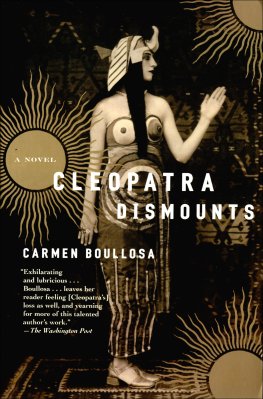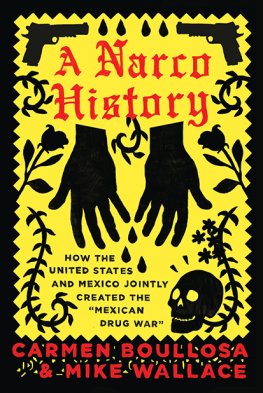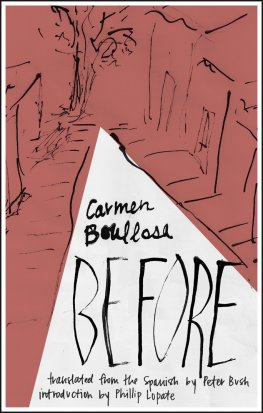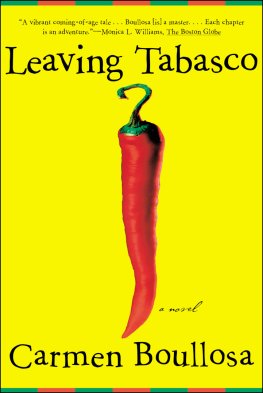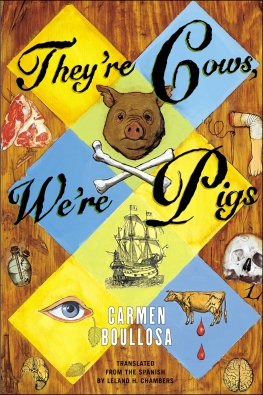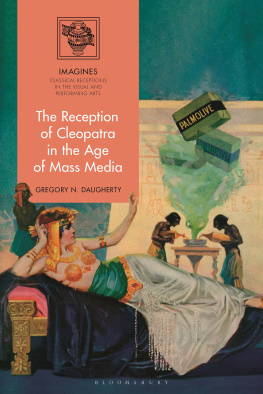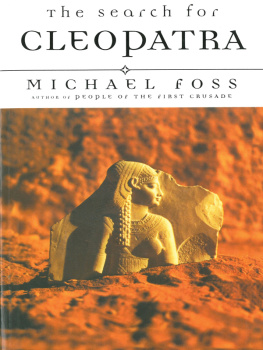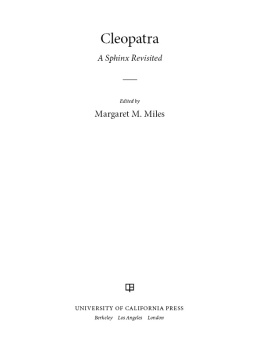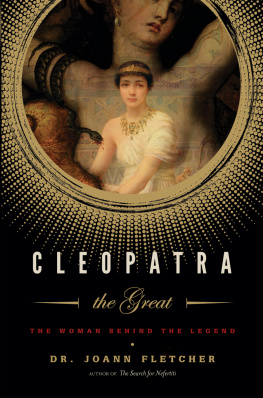Carmen Boullosa
Cleopatra Dismounts
To Roberto Bolao, Francisco Goldman, and Paul Berman,
to whom,
in one way or another, I owe this book.
My heart, my heart, be whole and free: Love is thine only enemy.
George Bernard Shaw, Caesar and Cleopatra
Diomedes, the funny old fart, left behind a pile of documents, written in his own hand, but he gave me no clear idea what to do with them. Im leaving you things I want preserved and copied, he said. My eternal rest depends on them.
With that, he lay down to sleep, for good. Without a word of goodbye! He breathed his last as if it were a matter of indifference.
His life went out like the flame of an exhausted oil lamp. Easier, because there was no guttering, no nervous flicker, no nothing. He gave up the ghost without a murmur. Imperturbably. Like a creature turned to stone. Exactly the way hed lived, at least for as long as Id known him. A man of stone, is precisely what he was. You know, I had never even heard the sound of his breathing.
My eternal rest, I ask you! Did he want more of the same, in death as in life? Wasnt he sick of his stone-like state? Always perched there, motionless, immovable, petrified. Day and night, bent over his writing tablet, like he was nailed to the thing, like an old bone drying out in that cell of his, forever shut in, forever silent, doing nothing that amounted to anything, just scratch, scratch, scratch on his wax tablet, scribbling away all hours of the day and night. What did he want more peace for? Hadnt he had more than his fill of it already?
Since the day I started as his assistant, he didnt open his mouth to me. And what a mouth! Plagued by open sores. He didnt seem to be aware how revolting his dying flesh was. He was so blind to his own condition and everything else he didnt even notice the difference between day and night. The only thing he attended to was the rapid scribbling of his stylus on the wax. Mr. Scratch-his-wax! What a disgusting, dreary, old bore!
Three years I spent at his place, right up to his death. I never heard him utter a word of complaint. And I was there the whole time, listening, waiting for orders. He never gave me a single one. My job turned out to be the same as his, to wait for his death. Finally he let his life slip away, the same way hed lived it, as if nothing were happening.
The total absence of drama, his desire not to rouse any desire, the will to reduce himself to absolute zero made him, I can tell you, as boring as hell! What could I have found interesting about him? That he was a record-breaking monument of dullness, maybe? Yes, theyd told me that he and Cleopatra, etc., etc. . But I wasnt going to fall for that crap. No way. A sucker I am not.
Yet, when I thought about Cleopatra, the last words to come to mind were boring, stupid, and decrepit. The mere mention of her name was enough to set bells ringing, shadows dancing, and handsome lips seeking out a handsome body. The name Cleopatra wakens the world to life.
I never figured out why Diomedes had hired me. Why the hell did he need a scribe at his side? What was the point of it? Nothing that I could see. Nothing at all. But I was a poor student and needed the cash. So I kept my mouth shut, pocketed the money, and got on with my job, which, to the best of my understanding, consisted of doing nothing.
I got dreadfully bored while he scribbled away like a man possessed. At the end, on that last day, he did give me an order, if you can call it that. I mean the few words he muttered before he died. Or burned out, as would be the truer description. Some people die, others just run out of fuel. Diomedes did the latter.
Thus, to fulfil my contract, now that he is gone, I read what hed been writing on those tablets during his last years. I read every single word. Then I started to copy them in my own hand, which is a lot firmer than the old mans was, and a lot more legible, too, for that is the nature and beauty of ink. So far Ive made two copies of his tablets. Once Ive finished chatting with you, Ill start on the third copy. After that, Ill do the fourth, the fifth, and so on, till the end of my days. To my eyes, they are not well organized, but thats the order in which he left the tablets. So of necessity, Ive made my own choices, and they are as follows: first, Cleopatra does the talking. Then Diomedes. In his rambling fashion he explains who he is and why he is transcribing the words of Cleopatra. Then come two more times the voice of Cleopatra, plus three short interventions from the old boy.
Ive referred to Diomedes as an old fart, who did nothing but scratch wax tablets instead of his fat belly and who really disgusted me. It took me a positive effort even to look at him, while he died there bit by bit, in silence, from his revolting disease. It was beyond my comprehension what I was doing there. But now Ive seen another side to him. Im not unsaying anything Ive said. Ill never rid my memory of his repulsive figure, but there is another way of seeing him. If I were to write his biography, Id have to make two versions. In the first, he would be this boring, motionless bulk, with disease eating away at his face. In the second, there would be a young man trapped inside that rotting carcass. What sort of man? Well, a lively, sparky character, with burning appetites and smothering regrets, alert and vital, eager to get the best out of life. How do I reconcile him with that silent hulk? How do I decide which was the real Diomedes? Do I need to decide?
In those texts, Diomedes was trying to recapture Cleopatras voice, trying to get her to speak through him. Isnt recapturing a sort of assimilating, eating, digesting? Im reminded of the horses of the hero Diomedes, which Euripides talks about. They devoured human flesh. Maybe the old boy was devouring Cleopatra in his way, while I thought he was doing nothing whatsoever. And motionless as he was, working on his too difficult digestion, for shes not an easy dish!
The old boy turned into a lively youngster. Now, look, hes turned into a flesh-eating stallion. You can see why he ended up with three different portraits of the same Cleopatra. Each one appears at a different period of her life. I placed them in the order I personally liked best. First, Diomedes presents her talking, while she awaits death at the hands of the Romans, a Cleopatra in defeat. Then comes the girl Cleopatra, escaping from her father at the age of twelve and seeking out the alliances that will elevate her to the Egyptian throne. In the third version appears the young queen. Once again, she has momentarily lost the throne and once again she goes in search of military allies to restore what properly belongs to her. Why did I adopt this order? Because, as I read them, I began to see Cleopatra through the eyes of Diomedes. These texts are both hers and his. He shows us his Cleopatra, filtered through his feelings for her, her starry night sky glimpsed through his humble, squinting eyes. Between one voice of Cleopatra and another, I let Diomedes interject his views. Here and there, I must confess, I have even added silently an observation or two of my own. Why not? I have valid opinions, too, you know.
I am still unsettled by the difference between the Diomedes who so scrupulously reflected Cleopatra in his writings, and the blindly indifferent figure, careless of his own welfare, whom I myself saw each day. I believe he caught the genuine accents of some of Cleopatras voice in these texts, as surely as if he again heard her speaking before him. But speaking in his own voice, the old boy revealed just how lost he had become.
Thats all I have to say. I am going to copy out one more version of these words that you can now read for yourselves.

